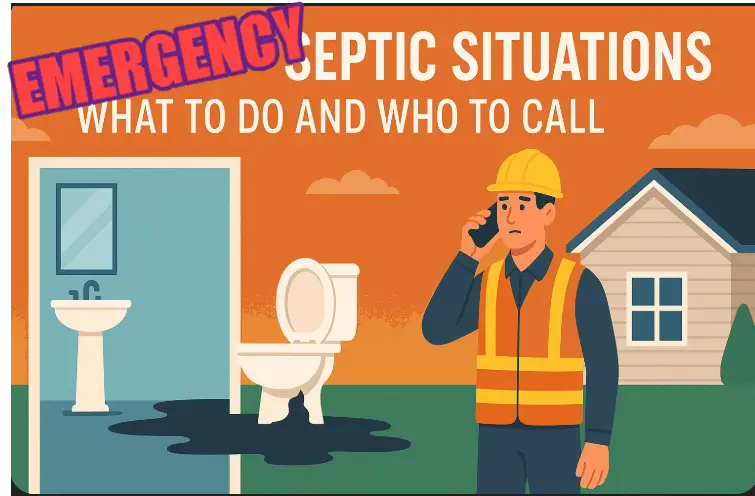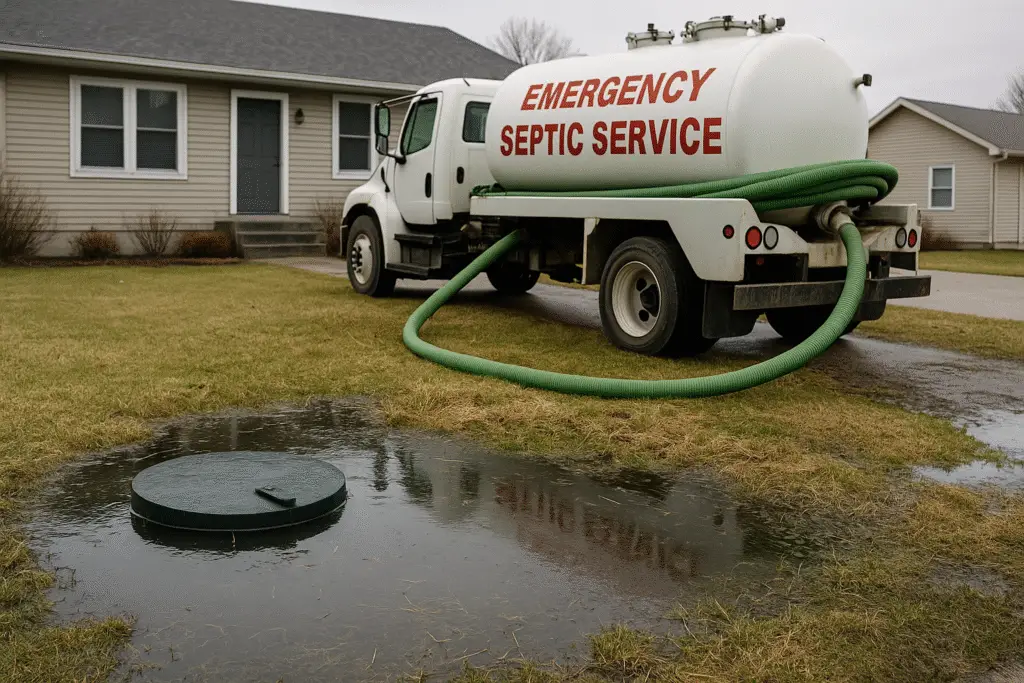It’s every homeowner’s nightmare—raw sewage backing up into your home, or foul-smelling puddles forming in the yard. Septic system failures can escalate quickly, causing major property damage and health hazards.
Knowing how to respond in a septic emergency could save you thousands of dollars and a lot of stress. This guide will show you how to recognize an emergency, what to do immediately, and who to contact for help.
Signs You’re in a Septic Emergency
Don’t ignore the red flags. The following symptoms often indicate a serious septic system failure that requires immediate action:
- Wastewater is backing up into sinks, tubs, or toilets
- Strong sewage odors inside or outside the home
- Standing water or soggy patches around the drain field or septic tank
- Gurgling sounds in the plumbing occur when water is used
- Toilets that won’t flush or refill properly
“One of the biggest mistakes homeowners make is continuing to use water during a septic backup. That only makes things worse.” — Lisa Carpenter, Licensed Septic Technician.
What to Do in a Septic Emergency
Acting fast can minimize damage and reduce your repair bill. Follow these steps immediately:
- Stop all water usage: Turn off faucets, dishwashers, washing machines, and toilets to prevent additional flow into the tank.
- Inspect your septic tank lid: If accessible, check for overflow, damage, or standing water near the lid area.
- Call a licensed septic professional: Describe your symptoms in detail—they may prioritize you for emergency pumping or repairs.
- Keep people and pets away: Contaminated water can pose serious health risks. Use barriers if needed.
- Document the damage: Take photos for insurance purposes and to help with future maintenance decisions.
“Photos taken during a septic emergency can help insurance adjusters understand the extent of damage. Don’t skip this step.” — Derek Hill, Home Claims Adjuster.
Who to Call During a Septic Emergency
- Septic service company: First call for emergency pumping, system evaluation, and repairs.
- Plumber: If backups are confined to one area, the issue may be isolated to your indoor plumbing.
- County health department: If sewage has reached groundwater, a ditch, or is exposed on your property.
- Home insurance provider: If damage affects your structure or landscaping.
Common Causes of Emergency Septic Failures
Many septic emergencies stem from a lack of regular maintenance. These are the most frequent culprits:
- Overdue tank pumping
- Clogged inlet or outlet pipes
- Collapsed or broken baffles
- Saturated drain field (especially after heavy rain)
- Tree root intrusion
- Sudden water overload (guests, laundry marathons, leaks)
“Ninety percent of septic system failures are preventable with routine pumping and inspections.” — Kelly Martinez, Septic System Inspector.
Preventing Future Septic Emergencies
Once your system is restored, commit to prevention. It’s less expensive and more reliable than emergency service calls.
- Have your tank pumped every 3–5 years (or as recommended)
- Never flush wipes, grease, or chemicals
- Divert rainwater away from your drain field
- Limit water usage during storms or freeze-thaw cycles
- Install a high-water alarm or effluent filter if not already in place
Conclusion: Fast Action Saves Thousands
A septic emergency is messy, stressful, and expensive—but fast action can prevent the worst. Know the signs, shut off your water, call the right experts, and don’t forget to document the situation. Afterward, focus on maintenance and education so you won’t be caught off guard again. For emergency service or annual care, keep Septic Service Center on your speed dial.
Worried your tank is overdue for pumping? Don’t wait for an emergency—check out our guide on Signs Your Septic Tank is Full.





